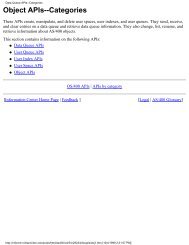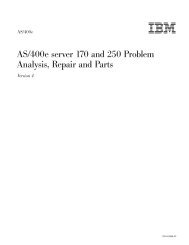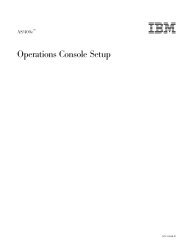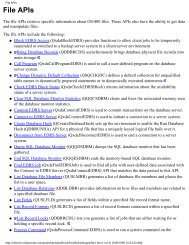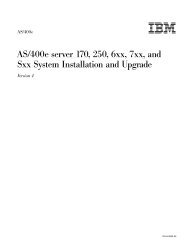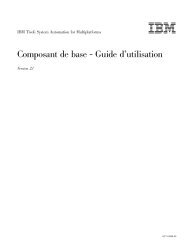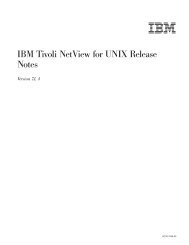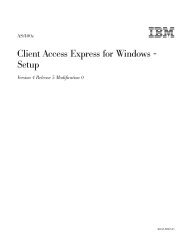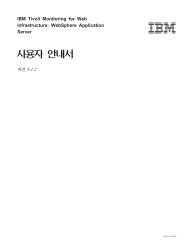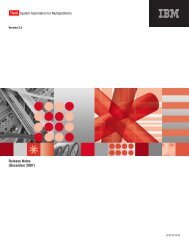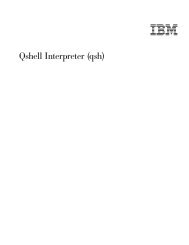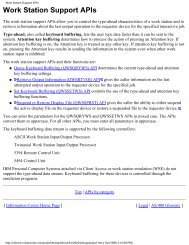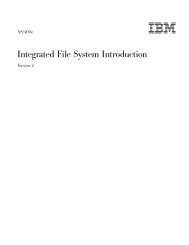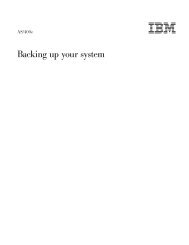Create successful ePaper yourself
Turn your PDF publications into a flip-book with our unique Google optimized e-Paper software.
100 <strong>File</strong> <strong>Management</strong> V4R5<br />
A field name cannot be specified if RCDFMT(*ALL) is specified when copying<br />
from a multiple-format logical file, or if the from-file is a device file or inline data<br />
file.<br />
See the following topics for additional information about specifying data for:<br />
v “Variable-length fields used by the INCHAR parameter”<br />
v “Null-capable fields used by the INCHAR parameter”<br />
v “Different CCSIDs used by the INCHAR parameter”<br />
v “DBCS-graphic fields used by the INCHAR parameter”<br />
Variable-length fields used by the INCHAR parameter<br />
When you specify *RCD for the INCCHAR parameter, the starting position<br />
represents the position in the buffer. The 2-byte length field of variable-length<br />
fields must be considered when determining the position. Use single-byte blanks<br />
(X'40') to pad variable-length fields if the INCCHAR value spans multiple fields.<br />
You can specify variable-length fields for the INCCHAR string when you specify a<br />
field name. The starting position represents the position in the data portion of the<br />
variable-length from-field value. The number of bytes that are compared is the<br />
number of bytes in the value that is specified for the INCCHAR string. If the<br />
actual data in the variable-length from-field is shorter than the value specified for<br />
the INCCHAR parameter, the from-field data is padded with single-byte blanks<br />
(X'40') for the comparison.<br />
You cannot specify a zero-length string for the INCCHAR value.<br />
Null-capable fields used by the INCHAR parameter<br />
The INCCHAR parameter allows null-capable character-field and null-capable<br />
DBCS-field names to be specified. However, any logical comparison with a<br />
null-field value tests as false, and the record is not copied. The copy command<br />
performs no special processing if the you specify the *RCD special value as the<br />
field name. The command only compares buffer default values for actual null<br />
values.<br />
Different CCSIDs used by the INCHAR parameter<br />
When you specify *RCD for the INCCHAR parameter, the copy command does not<br />
perform any conversions on the input string. The command compares the byte<br />
string that you entered at the specified position in the record buffer of the<br />
from-file.<br />
When you specify a field name, the command assumes that the input string is in<br />
the CCSID of the job in which the copy command runs. The input string is<br />
converted to the CCSID of the from-field. If no conversion table is defined or if an<br />
error occurs while converting the input string, a message is sent and the copy<br />
operation ends. If the command can correctly convert the value, the command uses<br />
the converted value for record selection.<br />
DBCS-graphic fields used by the INCHAR parameter<br />
When you specify a graphic field for the INCCHAR parameter, you should enclose<br />
the DBCS data in shift-out and shift-in characters. The command assumes that the<br />
data is in the associated DBCS CCSID of the job CCSID. There must be a valid<br />
conversion to the field CCSID; otherwise, an error occurs. The shift-out and shift-in



